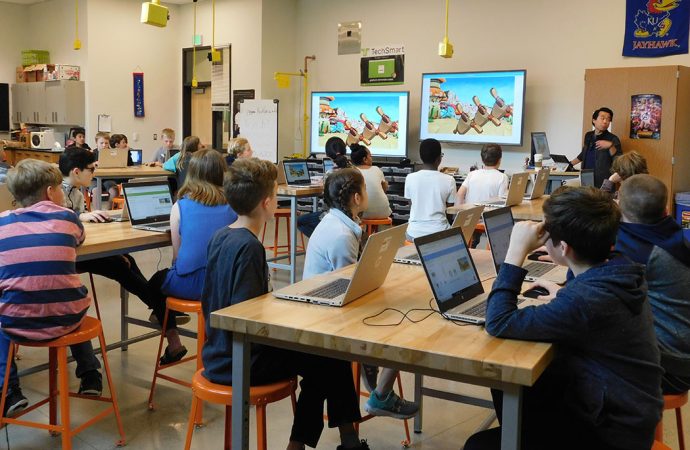Introduction: As an educator and technology enthusiast, I have witnessed firsthand the evolving role of digital technologies in reshaping educational paradigms. This article explores the future of education in a digital world, examining how technological advancements are revolutionizing learning environments, pedagogical approaches, and the overall educational experience. 1. Digital Transformation in Education Define the concept
Introduction:
As an educator and technology enthusiast, I have witnessed firsthand the evolving role of digital technologies in reshaping educational paradigms. This article explores the future of education in a digital world, examining how technological advancements are revolutionizing learning environments, pedagogical approaches, and the overall educational experience.
1. Digital Transformation in Education

Image by: Yandex
Define the concept of digital transformation in education. Discuss how digital technologies, including artificial intelligence (AI), virtual reality (VR), and interactive platforms, are enhancing teaching methodologies, student engagement, and educational outcomes.
2. Virtual Classrooms and Online Learning
Explore the rise of virtual classrooms and online learning platforms. Analyze the benefits of remote education, accessibility to diverse learners, and the role of digital tools in creating interactive and collaborative learning environments.
3. Personalized Learning and Adaptive Technologies
Discuss the shift towards personalized learning experiences facilitated by adaptive technologies. Explore AI-driven algorithms, data analytics, and personalized learning platforms that tailor educational content and pacing to individual student needs and preferences.
4. Digital Literacy and Skills Development
Address the importance of digital literacy and skills development in the digital age. Discuss initiatives to enhance students’ technological proficiency, critical thinking, problem-solving abilities, and ethical considerations in digital environments.
5. Challenges in Digital Education
Examine challenges associated with digital education adoption. Discuss issues such as digital divide, access to technology and internet connectivity, cybersecurity concerns, and maintaining equitable educational opportunities for all learners.
6. Teacher Roles and Professional Development
Explore the evolving role of educators in digital classrooms. Discuss the importance of teacher training, professional development in digital pedagogies, and the integration of technology-enhanced learning tools into curriculum design and delivery.
7. Global Perspectives and Cultural Integration
Analyze global perspectives on digital education and cultural integration. Discuss how digital technologies bridge cultural divides, facilitate global collaborations, and promote cross-cultural understanding among students and educators worldwide.
8. Ethical Considerations in Digital Learning
Address ethical considerations in digital learning environments. Discuss issues related to data privacy, student surveillance, digital citizenship, and responsible use of technology in promoting positive learning experiences and online safety.
9. Innovations in EdTech and Future Trends
Highlight innovations in educational technology (EdTech) and emerging trends shaping the future of digital education. Discuss advancements in AI, immersive learning experiences, gamification, and the potential of blockchain in credentialing and education management.
10. Future Outlook: Redefining Education for Tomorrow

Image by : Yandex
Conclude with a forward-looking perspective on redefining education for the future. Discuss the transformative potential of digital technologies in fostering lifelong learning, innovation, and preparing students for the dynamic challenges of a digitalized global economy.
Informative Table: Key Technologies in Digital Education
| Technology | Description | Examples |
| Artificial Intelligence (AI) | Enhancing personalized learning and data analytics | AI tutors, adaptive learning platforms |
| Virtual Reality (VR) | Immersive simulations and virtual field trips | VR classrooms, training simulations |
| Learning Management Systems (LMS) | Centralized platforms for course management | Moodle, Canvas, Blackboard |
| Gamification | Applying game elements to educational activities | Educational apps with game-based learning |
Comparative Table: Challenges vs. Opportunities in Digital Education
| Challenge | Opportunity | Impact |
| Digital Divide | Access to education for remote and underserved populations | Broadening access through online learning |
| Cybersecurity | Secure learning environments and data protection | Safeguarding student information and privacy |
| Technological Integration | Enhancing educational outcomes through digital tools | Improving student engagement and academic performance |
| Equity in Education | Addressing disparities in digital access and skills | Promoting inclusive learning environments |
Conclusion: Embracing Digital Transformation in Education
The future of education lies at the intersection of innovation and inclusivity in a digital world. By harnessing the power of digital technologies, educators can create dynamic learning environments that cater to diverse student needs, promote lifelong learning, and prepare learners for success in a rapidly evolving global landscape. As we navigate challenges and seize opportunities in digital education, collaboration, innovation, and equitable access to educational resources will be key in shaping a brighter and more inclusive future for learners everywhere.
















